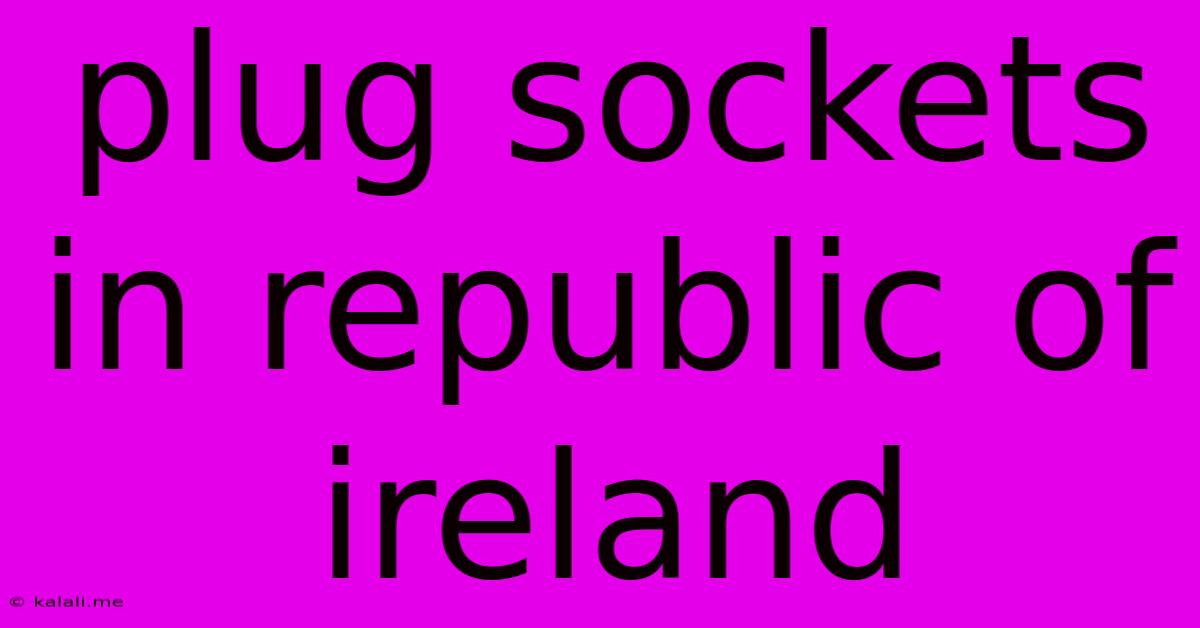Plug Sockets In Republic Of Ireland
Kalali
May 21, 2025 · 2 min read

Table of Contents
Understanding Plug Sockets in the Republic of Ireland: A Comprehensive Guide
Meta Description: This guide provides a complete overview of plug sockets used in the Republic of Ireland, including voltage, frequency, plug types, and adapter recommendations for travellers. Learn everything you need to know about Irish power outlets before your trip!
The Republic of Ireland uses a standard electrical system that differs from many other countries, so understanding Irish plug sockets is crucial for visitors and residents alike. This article will cover everything you need to know about electricity in Ireland, ensuring a safe and hassle-free experience.
Voltage and Frequency in Ireland
Ireland operates on a 230V electrical system with a frequency of 50Hz. This is important to know because appliances designed for different voltages (like 110V in North America) will not work correctly, and may even be damaged, if plugged directly into an Irish socket.
Types of Plug Sockets in Ireland
The standard plug type used in Ireland is Type G, also known as a BS 1363 plug. This is a three-pin plug with a rectangular shape and a fuse incorporated into the plug itself. This safety feature helps protect against electrical surges and overheating.
Key Features of the Type G Plug:
- Three pins: A live pin, a neutral pin, and an earth pin.
- Fuse: A built-in fuse provides additional safety.
- Rectangular shape: Helps prevent accidental misalignment and ensures a secure connection.
Adapters and Converters: What You Need
If you're travelling to Ireland from a country with a different plug type, you'll need an adapter. An adapter simply allows your plug to fit into the Irish socket. However, it does not change the voltage or frequency.
If your appliance is designed for a different voltage (e.g., 110V), you'll also need a converter or a transformer. This device converts the voltage to match your appliance's requirements. Using an appliance with an incompatible voltage without a converter can result in damage or fire.
Important Note: Always check the voltage and frequency requirements of your appliances before using them in Ireland. Using incorrect voltage can damage your devices and may be dangerous.
Finding Adapters and Converters
Adapters and converters are readily available in many shops in Ireland, including electronics stores, supermarkets, and pharmacies. You can also purchase them online before your trip for convenience. Be sure to purchase a quality adapter and converter to ensure safety and reliability.
Safety Precautions When Using Electrical Appliances in Ireland
- Always use the correct adapter and converter (if necessary).
- Never overload sockets.
- Check for any signs of damage to plugs, sockets, or cables before use.
- Unplug appliances when not in use.
- Be cautious when using electrical appliances near water.
By understanding the specifics of Irish plug sockets and taking necessary precautions, you can ensure a safe and enjoyable stay in the Republic of Ireland. Remember that safety should always be the top priority when dealing with electricity.
Latest Posts
Latest Posts
-
Can Muslim Women Marry Non Muslim Men
May 21, 2025
-
Why Japan Is Called Land Of The Rising Sun
May 21, 2025
-
Heathrow Airport Terminal 5 Post Office London
May 21, 2025
-
How Long Do Head Gaskets Last
May 21, 2025
-
What Does It Mean When A Kitten Licks You
May 21, 2025
Related Post
Thank you for visiting our website which covers about Plug Sockets In Republic Of Ireland . We hope the information provided has been useful to you. Feel free to contact us if you have any questions or need further assistance. See you next time and don't miss to bookmark.